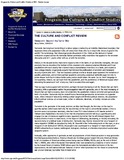Viewpoint Beyond the Terror War
| dc.contributor.author | Zellen, Barry | |
| dc.date | 8/30/2010 | |
| dc.date.accessioned | 2013-01-28T17:22:06Z | |
| dc.date.available | 2013-01-28T17:22:06Z | |
| dc.date.issued | 2010-08-30 | |
| dc.identifier.citation | Culture and Conflict Review (Summer 2010), v.4 no.2 | |
| dc.identifier.uri | https://hdl.handle.net/10945/27365 | |
| dc.description | This article was published in Culture and Conflict Review (Summer 2010), v.4 no.2 | en_US |
| dc.description.abstract | "Genocide has long been something of a taboo subject, marked by an indelible Manichean boundary that separates those who perpetrate it (the evil ones) from those who try to stop it (the forces of good in the world.) The terminology that infused genocide discussions in the 1990s as this darkest of human endeavors erupted across the fratricidal Balkan peninsula oddly resembles that applied to the terrorism discourse post 9/11: you're either with us, or with the terrorists. Indeed, in the decade before mass terror ripped a hole in the fabric of our domestic tranquility, this was precisely how we described the Serbian ethnic cleansers who attacked unarmed Bosniak and Croat populations with such cruelty that it turned many a humanitarian from dove to a hawk, and created a new cottage industry of genocide experts that mirrored the proliferation of terrorism and homeland security experts after 9/11. That two traumatic political events a decade apart spawned the formation of parallel, passionate, and at times partisan academic and policy-analytical subfields eager not only to probe deeper truth but to induce bolder policy action would share the same 'us vs. them' language is not surprising. Indeed, we can learn from the parallelism, and the persistence of historical myopia when assessing the paramount 'evil' of any era, that is revealed time and again." | en_US |
| dc.publisher | Naval Postgraduate School (U.S.) | en_US |
| dc.publisher | Program for Culture and Conflict Studies | en_US |
| dc.rights | This publication is a work of the U.S. Government as defined in Title 17, United States Code, Section 101. Copyright protection is not available for this work in the United States. | en_US |
| dc.title | Viewpoint Beyond the Terror War | en_US |
| dc.contributor.corporate | Program for Culture & Conflict Studies |


